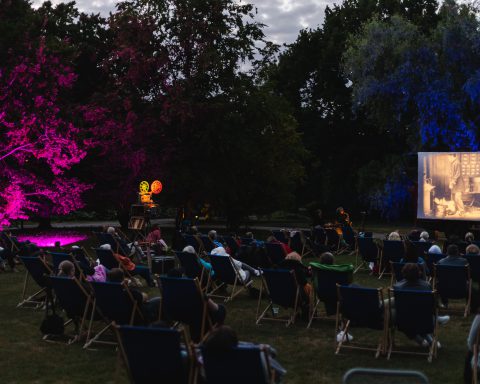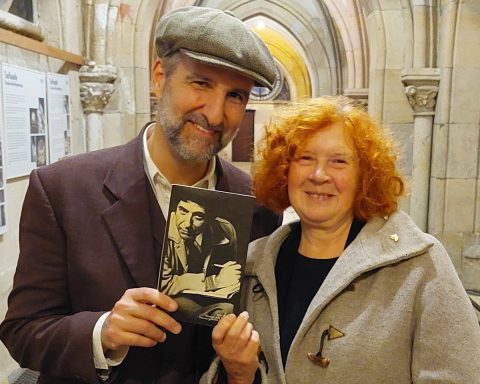Welcome back to our list of the best of films of 2019. We are now down to the top 5!
Hot on the heels of the 2020 Oscar nominations being announced, we can already revisit the first part’s major success story: Honeyland, a favorite of the LeipGlo Team at DOK Leipzig 2019, has not only snagged a nomination for best documentary feature but also got into the coveted best foreign feature film category.
Other major contenders this year will be coming up shortly in this second half. But first, some honorable mentions – films that did not make it to the top 10 but nonetheless impressed and surprised me.
Only barely missing out on a top spot and continuously rumbling under my thoughts is the masterful late work by Spanish film legend Pedro Almodovar, called Dolor y gloria.
This more than vaguely autobiographical tale of a filmmaker struggling with aging, depression and heroine addiction is so thoroughly of and by its director. It almost feels intrusive to watch Almodovar figure himself and his thoughts out on screen. Acting as his surrogate, Antonio Banderas delivers a career-defining performance. Deservedly, he was rewarded with a best actor Oscar nomination along with the nod for best foreign film.
Another major release that mostly lived up to its hype by creating a peerless vision of early 70’s Hollywood is the newest Quentin Tarantino picture, Once Upon a Time… in Hollywood.
The Tarantino film felt strongest and freshest when it just let its strong characters roam this Tinseltown playground freely. It’s a hangout film of the highest quality, with so many bright and wonderful images to observe. Unfortunately, it squanders a lot of its good will towards the last 30 minutes, when Tarantino resorts to his typical style of blood-soaked revisionist history. Nonetheless, the many nominations – including DiCaprio’s and Pitt’s performances and most of all production design – are warranted.
Finally, I want to give a shout-out to the best original screenplay nominee Knives Out, which pits a murderers’ row of A list actors against one another in a modern take on the timeless Agatha Christie-style crime narrative.
Director Rian Johnson took his blank check from Star Wars: The Last Jedi and used it to make a ridiculously entertaining murder house. In it, Southern gentleman detective Benoit Blanc (Daniel Craig) has to suss out who of the many suspect characters in the upper-class Thrombey family killed their patriarch (Christopher Plummer). While this little murder mystery does not reinvent the wheel, it succeeds in transporting an ancient formula into a modern and relevant tale of privilege and hubris with a lot of laughs.
But enough preamble already; here are the five best films of 2019!
5. Ad Astra, by James Gray
Snubbed by the Academy, James Gray’s Ad Astra was one the most emotional movie experiences I had in the past year – despite being told mostly in rather cold, removed voice-over recordings by Brad Pitt’s astronaut character. His job requires him to stay in control first and foremost, monitoring his heart rate and headspace in routine interviews prodding his state of mind.
Without hitting the viewer over the head with it, Ad Astra finds a metaphor for the inherent cruelty and inhumanity that we have culturally come to expect from a stoic hero protagonist. Pitt’s portrayal and his understated struggle with suppressed and over-controlled emotion manage to give Ad Astra a strong human base. Consequently, its ludicrously exciting and large-scale action pieces hit the screen even harder than a normal action film could.
From Moon to Mars to Neptune, each stop onward “to the stars” is more wondrous than the last, partially because it brings Pitt closer to increasingly painful and more-or-less cathartic encounters along the way.
Director Gray challenged not only Pitt’s astronaut Roy McBride but also himself and his cast and crew, creating and populating awe-inspiring but still grounded new worlds within our solar system. He manages to walk the fine line between perfectly comprehensible and fabulous speculative fiction on human space expansion.
It is, therefore, all the more impressive how deeply felt the film’s close human interactions are. Alongside Pitt’s McBride, the audience can experience years of stoically suppressed emotions break open. Roy McBride’s issues and personal strain seem more universal and prescient than this space opera has any expectation or right to be.
4. Portrait of a Lady on Fire, by Céline Sciamma
Nearly all scenes in Portrait of a Lady on Fire take place on a small, remote island with mostly the three main actresses in the picture. Building on that intimacy is a romance that develops as organically and beautifully as the eponymous painting itself.
Artist Marianne (Noémie Merlant) is commissioned by the Countess (Valeria Golino) to paint a portrait of her now eligible daughter Héloïse (Adèle Haenel). Angered and embittered by her powerlessness, Héloïse protests against her marrying off the only way she can: by refusing to pose for the essential portrait necessary to entice her betrothed. So, Marianne has to keep her profession and intentions a secret. She spends time with Héloïse under the guise of companionship by day. Independently and in secret, she then tries to paint her by night.
However, the isolated intimacy and genuine connection they share soon bind these women’s separate journeys into a uniquely natural romance. It’s a basic premise that’s timeless and yet so perfectly suited for a period piece.
Director Céline Sciamma achieves nothing short of extraordinary in all technical aspects of her production.
The 18th-century French island setting feels complete and organic. It’s so strikingly beautiful that each production aspect jumps out at you as truly exceptional and noteworthy. From the characters’ wardrobe to elegant editing that makes this romance unfold and flow so perfectly, every wrinkle in Portrait is its own achievement. Which makes it all the more disappointing that most major awards, including the Oscars, have completely ignored this universally beloved and lauded film.
3. The Farewell, by Lulu Wang
Another major snub this awards season was The Farewell.
Lulu Wang’s second feature is based on a true story. Oftentimes, films with this label tend to only give a peek into the bigger picture, some historical or unbelievable event that is roughly sketched into a two-hour narrative. Consequently, these films are also mostly rather impersonal affairs: interesting but not moving. Wang goes against this convention in making her film as personal of an affair as possible.
Based on a personal account by Wang on the seminal radio program and podcast This American Life, The Farewell tackles the culture shock between Western and Chinese conventions around dying family elders. Sounds like a dour subject; however, Wang’s confidently dramatic and yet surprisingly light direction make this film funny and heart-breaking in equal measure.
Her screen surrogate Awkwafina plays a second generation Chinese-American immigrant whose grandmother is diagnosed with terminal lung cancer. Following tradition, her immediate family does not tell her about her diagnosis. Instead, they all gather back in China under the pretense of a cousin’s wedding.
After this celebratory table is set, a hilarious and touching journey through cultural differences, generational divides, family quarrels, but most of all pure love for one another, unfolds.
Next to Awkwafina’s lead Billi, the extremely charismatic and absolutely hilarious performance by Shuzhen Zhao as her grandmother is an absolute standout. Without her deeply empathetic portrayal, the wizardry of turning a depressing and alienating procedure into an emotionally resonant yet funny farewell would never have worked.
2. The Irishman, by Martin Scorsese
Martin Scorsese is the godfather of modern mafia stories. His works, from Mean Streets to GoodFellas, have dictated the modern vernacular for nearly all mafia movies that followed.
Consequently, his revisiting of the genre had to be a special kind of affair. But instead of going for a joyous parade of his greatest hits, The Irishman is more a requiem than a hymn: a wistful and gloomy look back. It revels in just how numb and deeply hollowed out the people in this line of work really become. Only in the late seasons of the fantastic HBO show The Sopranos has a crime story been told with this much heft and dreary malaise.
Throughout its three-hours-plus of run time, The Irishman continually captivates and engages its audience. I would recommend seeing the movie in a theatre in one sitting. However, thanks to Netflix’s deep pockets, you can also enjoy it in increments from the comfort of your couch.
De Niro’s titular Irishman Frank Sheeran has such a passive, removed energy that it makes the murderer he portrays seem somehow more pitiable than he has any right to be. His mannerisms, especially when in distress, manage to elicit empathy for a monster.
Incredibly, De Niro’s performance is nonetheless overshadowed by two other silver screen legends giving career-high performances with polar opposite flavors.
Joe Pesci and Al Pacino show that very different approaches work for very different characters. So successfully that both got Oscar nominations as best supporting actors.
Pesci juxtaposes our expectations of him as a chronic choleric with constant firecracker energy. As Sheeran’s buddy and mafia boss Russell Bufalino, he delivers his most subdued and sympathetic character to date.
Meanwhile, Pacino gets a grand canvas to play with in legendary American history figure Jimmy Hoffa, and just goes for it. His blustering swagger occupies every room he’s in and you can instantly understand the Irishman’s enamorment with this larger-than-life hurricane of a man. Which brings me to the main reason why this three-hour elegy managed to entertain and captivate despite its decidedly bleak and slow narrative.
I haven’t seen such brutally well-observed humor outside of specific comedic auteurs for quite some time. There are scenes that mix tragic and jarring moments so well with humor. The lessons that can be learned from this epic about masculinity, friendship, betrayal and the American experience will most likely put their hooks in you and come to the surface well after seeing it.
I do not want to go into detail here as there are many ways to see this grand piece of film. Just know that these old men and their follies will give you ample room to think, even if you come out of the film with no more than a good time.
1. Parasite, by Bong Joon-Ho
It’s Parasite. Of course. Bong Joon-Ho’s surprise crossover hit has pretty much exploded the film industry’s standard expectations of international festival fare.
The success story of Parasite started in Cannes. There, it was the first South Korean film to win the Palm D’Or and did so by unanimous vote from the jury. From then on, Parasite continuously picked up steam from every new territory it played in. By now, it has already grossed more than $130 million worldwide against a budget of just over $10 million.
Currently, it is still playing here in Leipzig for the fourth consecutive month. And just last week, it received a whopping six Oscar nominations, including best feature, another first for a South Korean film. Even in this regard, director Bong has been subverting expectations. When asked about the Oscars never having nominated a South Korean movie, he said, shrugging:
It’s a little strange, but it’s not a big deal. The Oscars are not an international film festival. They’re very local.
Big deal or not, Parasite is now part of the show. And while it might not take home any of the hardware, its other achievements are already overshadowing any single award.








![Wine & Paint event on 9 Nov. 2024 at Felix Restaurant, Leipzig. Photo: Florian Reime (@reime.visuals] / Wine & Paint Leipzig](https://leipglo.com/wp-content/uploads/2024/12/pixelcut-export-e1733056018933-480x384.jpeg)

